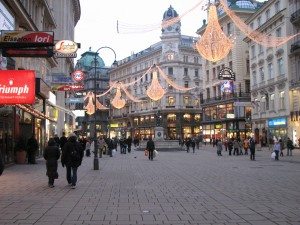 Things are different in Austria. This is why we came of course. If things weren’t different, we’d be wasting a whole lot of energy on this trip. First off, I should be very clear that Austria is not Germany. They are pretty particular on this point. Austrians ruled the world (or at least a big chuck of it) for 800 years and they did it relatively peacefully. The collective consciousness is calm and independent. Maybe they are calm because of the wind that never stops blowing (my own personal theory) and independent because they have had 5 different governments over the past 90 years (and only the very independent can survive the school system). Whatever the reasons, they have been amazingly successful within the EU and are certainly benefiting from the lifting of the iron curtain. Trams wait for pedestrians to cross in front. Drivers are prepared to stop for cars that are pulling out or children running across crosswalks. Children walk to school or take public transport alone from an early age. Social services are delivered to everyone from fabulous parks, to health care, to public transportation, to German language courses for immigrants and city festivals.
Things are different in Austria. This is why we came of course. If things weren’t different, we’d be wasting a whole lot of energy on this trip. First off, I should be very clear that Austria is not Germany. They are pretty particular on this point. Austrians ruled the world (or at least a big chuck of it) for 800 years and they did it relatively peacefully. The collective consciousness is calm and independent. Maybe they are calm because of the wind that never stops blowing (my own personal theory) and independent because they have had 5 different governments over the past 90 years (and only the very independent can survive the school system). Whatever the reasons, they have been amazingly successful within the EU and are certainly benefiting from the lifting of the iron curtain. Trams wait for pedestrians to cross in front. Drivers are prepared to stop for cars that are pulling out or children running across crosswalks. Children walk to school or take public transport alone from an early age. Social services are delivered to everyone from fabulous parks, to health care, to public transportation, to German language courses for immigrants and city festivals.
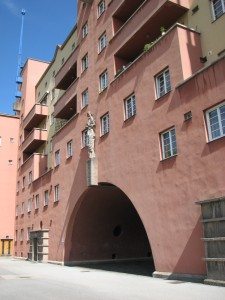 Part of this socialist legacy is also a sense that everyone has a place in society. This has its pros and cons. Programs for the disabled seem tremendous and there are many programs. But, they take place in special places for the disabled. If you are disabled, you belong in these special places. We have an acquaintance who will be moving back to England to allow her deaf son access to mainstream society. Likewise, there are programs for children everywhere. If you want to go hiking in the Alps, you can get a big brochure full of “huts for children.” What about the other huts one wonders? There is even special chocolate “fur kinder.” And, at the end of 4th grade, all students are sorted (to put a nice word to it) into those who will go on to gymnasium and have a chance at university and those who will not. Those who will not can go on and get specialized trade skills. There is a certain something to this system. Students who are academically challenged can find success in other skills, most trade professions have a highly skilled workforce, and, unlike in the US, you can make a nice living and have wonderful social benefits without university*. All this said, I cannot shake my American values and one of these can be embodied in the phrase “Anyone can grow up to be President.” My Austrian friends might counter that this is clearly not true in the USA but the underlying philosophy is alive and well. I can’t endorse a system in which a 10 year old already knows he (or she) has little chance to change his own future.
Part of this socialist legacy is also a sense that everyone has a place in society. This has its pros and cons. Programs for the disabled seem tremendous and there are many programs. But, they take place in special places for the disabled. If you are disabled, you belong in these special places. We have an acquaintance who will be moving back to England to allow her deaf son access to mainstream society. Likewise, there are programs for children everywhere. If you want to go hiking in the Alps, you can get a big brochure full of “huts for children.” What about the other huts one wonders? There is even special chocolate “fur kinder.” And, at the end of 4th grade, all students are sorted (to put a nice word to it) into those who will go on to gymnasium and have a chance at university and those who will not. Those who will not can go on and get specialized trade skills. There is a certain something to this system. Students who are academically challenged can find success in other skills, most trade professions have a highly skilled workforce, and, unlike in the US, you can make a nice living and have wonderful social benefits without university*. All this said, I cannot shake my American values and one of these can be embodied in the phrase “Anyone can grow up to be President.” My Austrian friends might counter that this is clearly not true in the USA but the underlying philosophy is alive and well. I can’t endorse a system in which a 10 year old already knows he (or she) has little chance to change his own future.
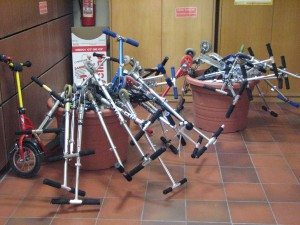 School in Austria is about being perfect. And, German, it seems, must be perfect to be German. At Zoey’s school’s open house, her German teacher reported all of Zoey’s German flaws (of which there are many since she had only been taking the language for 4 months) despite her many successes (that she can do any homework at all and that she can figure out what’s going on at all seems like a big success to me). Her English teacher, on the other hand, reported only successes and then, at the very end, mentioned that her spelling could be improved (also an understatement). This perfectionism definitely inhibits the Austrian spirit. I wish I could send a radio broadcast to the whole country “American’s don’t mind if you make a grammar mistake in English. It’s OK. We probably won’t even know.” Kids here are only told of their mistakes. On the other hand, a friend had to pull her son out of the American School because she felt that he wasn’t challenged and she was supposed to jump up and down and give him a present every time he did anything; “oh wow, he drew a straight line, we should have a party.”
School in Austria is about being perfect. And, German, it seems, must be perfect to be German. At Zoey’s school’s open house, her German teacher reported all of Zoey’s German flaws (of which there are many since she had only been taking the language for 4 months) despite her many successes (that she can do any homework at all and that she can figure out what’s going on at all seems like a big success to me). Her English teacher, on the other hand, reported only successes and then, at the very end, mentioned that her spelling could be improved (also an understatement). This perfectionism definitely inhibits the Austrian spirit. I wish I could send a radio broadcast to the whole country “American’s don’t mind if you make a grammar mistake in English. It’s OK. We probably won’t even know.” Kids here are only told of their mistakes. On the other hand, a friend had to pull her son out of the American School because she felt that he wasn’t challenged and she was supposed to jump up and down and give him a present every time he did anything; “oh wow, he drew a straight line, we should have a party.”
Another major culture difference is in how information is acquired. In the US, one is given lots of information. For example, there might be an orientation program at the beginning of a new job and friends tell you things that they think you might need to know. Here, you need to ask. It’s hard to know what you need to ask for though since, by definition, you don’t know. For example, I wanted to buy a RT train ticket to Kracow. The man at the train ticket office found a super cheap ticket to Krocow and advised me to buy it but said that he couldn’t sell me a ticket home. “Please come back tomorrow to buy the ticket home.” So, I came back the next day and he said “I’m sorry, I can’t sell it to you, please come back next week.” This went on for a few weeks until I got fed up and went to the main train station. They also found the ticket I wanted and then told me that I needed to come back. What is going on??? I finally went into a travel agent and asked for the ticket from Kracow back to Vienna. This woman confirmed what I suspected “I can’t sell you that ticket.” When I started to get upset and confused she finally explained. “In Austria, you can buy the tickets 3 months in advance but in Poland you can only buy the ticket one month in advance. Go to the ticket office in 6 days and then you can buy the ticket.” Where was this information 6 weeks earlier???? From there I went to the mountaineering office to find out about hut to hut hiking opportunities. They gave me the special brochure for children. When I asked about specific huts, they told me that I had to come back at 4pm. At 4pm there would be a special person who could give me information about specific huts. I went back to my office and asked about where to post a sign for a language exchange. “At the office of international exchanges across the street” they told me. Office for international exchanges across the street??? This is the first I had heard of such an office. It turned out that they had German courses (which I had missed), information in English on a wide range of topics, and, I think, other programs, but you had to stand in a line to ask about those programs and I was pretty well fried by this point. No one is being mean or unfriendly or withholding information, they just can’t really imagine that you don’t already know. Later, at the Lunz Course, I was teased by an Austrian who had spent time in the USA about all the information coming at you from every direction in the USA and how it was totally silly and overwhelming.
A small but subtle difference is silence. Americans, I have learned, hate silence. I think I drove my Austrian colleagues insane for the first month or two because they would be silent at the end of a meeting and so I would ask a question or make a statement to fill the space. Meetings never ended. I couldn’t figure it out. Then I got it, Silence is used to check that there are no more details to discuss. Silence happens for a minute or so and then we agree that the meeting is over. Ooops.
Health care is different too. My German/American friend said that American’s rely too much on technology – you know, using Aspirin when you have a fever. A cup of tea works just as well she says, it just takes longer. And, there is a tea for everything here. They have a whole wall of tea in the Apoteke (pharmacy/chemist). The Apoteke sells pretty much only prescription medications and tea. I went to a sports medicine doctor because I pulled my back and waited in line for 45 minutes to see the doctor for 5 minutes (not so different from the US). I was told to go to the radiologist and have x-rays taken. Luckily, the radiologist takes credit cards (again, not so different from the US) and then they handed me the x-rays that I purchased in a nice shopping bag. My x-rays. Mine to keep, to store, to take to the doctor, to archive. Mine forever. Weird. The doctor looks at these x-rays on the next visit, tells me to take off my clothes (no dressing gowns here – no way, kids change down to their underwear together at least through grammar school and changing rooms for the swimming pool are co-ed), lies me on a table, pulls an arm and a leg until we hear a popping sound and then prescribes a series of 10 whirlpool treatments. I am not to wear a bathing suit to these treatments because the suction of this whirlpool will suck it off! Today was the first of these treatments. It was in was a big medicinal-looking tub with a thousand jets and dials and a digital display that ticked off the 15-minute treatment while visually describing where the jets were coming from and what part of my body they were aiming for. This tub was followed by 10 minutes of ultrasound and then 15 minutes during which suction cups were attached to my back with electrical currents running in between. Yeah, Americans have an over-reliance on technology??? We shall see if I make it through all 10 of these treatments. I am, in any case, enjoying the experience.
So, the official purpose of my Fulbright is to “promote mutual understanding between the people’s of Austria and the United States.” I still can’t explain our politics to anyone. “Please explain why I have never met anyone who voted for George Bush and yet he has been elected twice?” I met a computer engineer/math teacher from Hungary on the train who was so surprised that American’s could be nice (and even have chickens!) that he invited us all to visit his home and the World heritage Site monastery in his small town. All in all, I have probably learned more about America, myself, and English than about anything else. Opportunity and diversity are key values. Silence can mean many things. I believe in Ibuprofen more than tea. And, a few pleasantries make life much more … well … pleasant. And English? How many of you know “vagility”, “foehn”, or “biocoenose”?
So, on to Vienna. Vienna is a nearly perfect city. There are parks and green spaces everywhere. The public transportation is fabulous. City buses take you 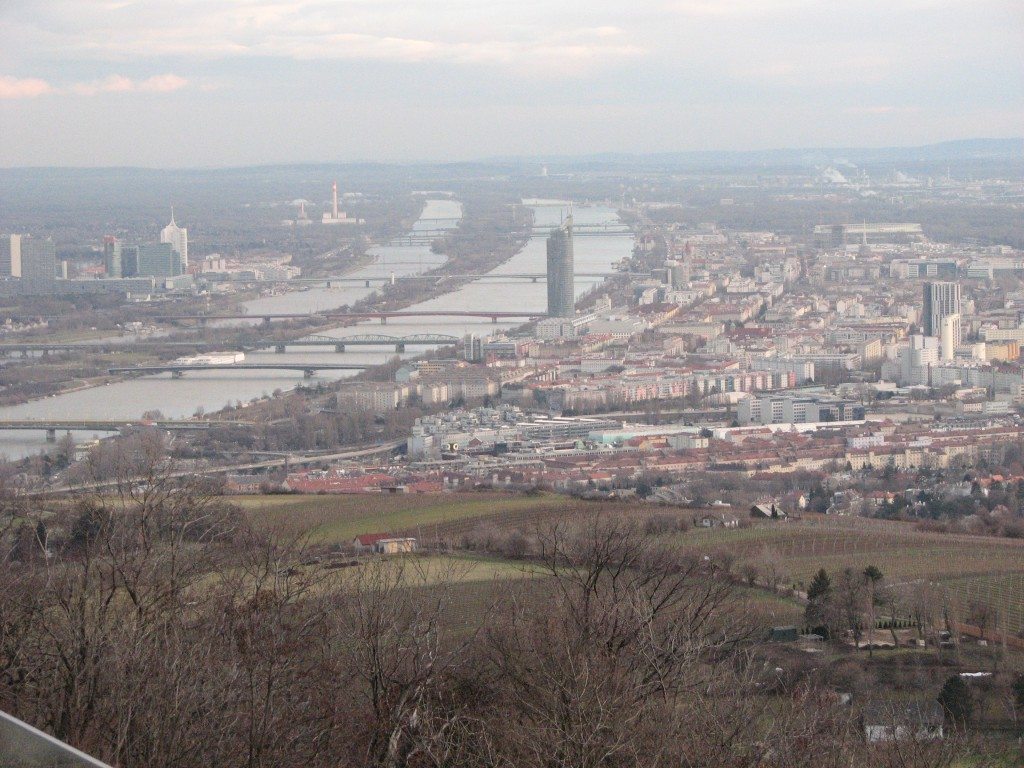 into the woods where you can walk or hike for miles. Café’s spill out onto the streets and gelato stands are ubiquitous. While there isn’t a lot of smiling between strangers, there is a wonderful sense of neighborhood and everyone (less 9 women) has been friendly and interested. The smiles come with time and they demonstrate real warmth. We have been invited to people’s homes and to special events. One woman asked me if I had time for a “CultureLife” while I was here. I don’t know if this is really a German word or a funny attempt at English but it is a quintessentially Viennese idea – a culture life. One must have a professional life, a social life, and a culture life. You know … opera, ballet, classical music, and theater. The Danube is nearby (not quite well-enough integrated into the city) and you can swim and play or bike or run along the banks. Oh and soccer … Euro2008 will be held here in June and our local mall is now bedecked in golden soccer balls, there are displays of historical soccer uniforms, the city has put up red soccer player statues in all the parks, both kid museums (museums “fur kinder”) have soccer exhibits, they are selling Euro2008 playing cards everywhere, our trams are painted so that the giant foot appears to kick when the tram turns a corner, and even the bakery chains are now selling soccer-balled shaped bread. Every single hotel within an hour of the city is booked as well as all of the trains coming and going. What will June be like?
into the woods where you can walk or hike for miles. Café’s spill out onto the streets and gelato stands are ubiquitous. While there isn’t a lot of smiling between strangers, there is a wonderful sense of neighborhood and everyone (less 9 women) has been friendly and interested. The smiles come with time and they demonstrate real warmth. We have been invited to people’s homes and to special events. One woman asked me if I had time for a “CultureLife” while I was here. I don’t know if this is really a German word or a funny attempt at English but it is a quintessentially Viennese idea – a culture life. One must have a professional life, a social life, and a culture life. You know … opera, ballet, classical music, and theater. The Danube is nearby (not quite well-enough integrated into the city) and you can swim and play or bike or run along the banks. Oh and soccer … Euro2008 will be held here in June and our local mall is now bedecked in golden soccer balls, there are displays of historical soccer uniforms, the city has put up red soccer player statues in all the parks, both kid museums (museums “fur kinder”) have soccer exhibits, they are selling Euro2008 playing cards everywhere, our trams are painted so that the giant foot appears to kick when the tram turns a corner, and even the bakery chains are now selling soccer-balled shaped bread. Every single hotel within an hour of the city is booked as well as all of the trains coming and going. What will June be like?
This brings me to coming home, which I am, to be honest, sort of dreading. We have been so excited about this adventure for so long and I can’t believe it’s nearing an end. There are so many things left to do here and the weather is now magnificent.
*Note: This post is nearly verbatim from a long e-mail that pretty much poured out of me after failing to write home for several months. I do not want to change it now. I want it to reflect what I was thinking then. However, please read the comment below about the Austrian education system. I very much appreciate the correction and the new insight. Comments and new insights make all the blogtime worthwhile. In fact, I think our family needs to return to Austria and spend more time outside of the major cities in order to more deeply understand the country!

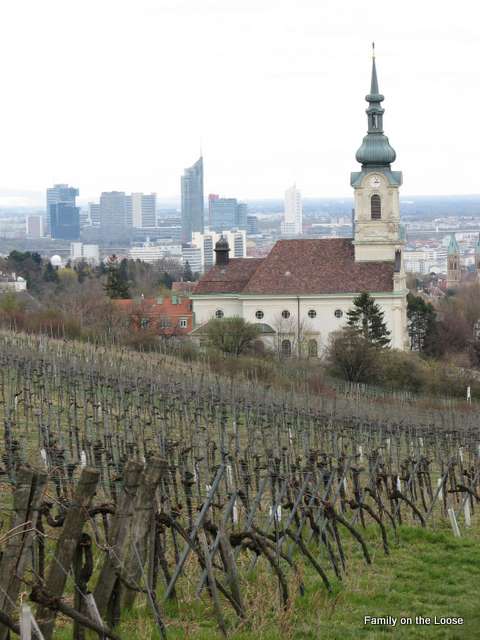
Hello! I’m curious about how you found long-term accommodations in Austria for the duration of your sabbatical. We are contemplating a 6-month “trip” to German-speaking Europe and would like to live in one home for the duration and send our kids to kindergarten. Any thoughts or suggestions you have would be helpful. Many thanks!
We looked for a German language tutor in our home town by contacting German pre-schools, German department at Colleges and Universities, and posting a note at our local German deli. The fabulous woman who was our tutor ended up also being our landlord! I would suggest contacting lots of folks here and asking about rentals there. There are many housing options that never get advertised publicly so just one face-to-face contact can mean alot. There are also plenty of nice apartment rentals and any landlord would love to have you as a long-term rental. He/she would likely offer a substantial discount. The advantage of a sublet or a long-term vacation rental is that you won’t have to register utilities etc. Be very clear about what’s included … sometimes ceiling lamps and major appliances aren’t part of the deal. You can also check wanderingeducators.com for sabbatical exchanges.
Though you didn’t ask, I will drop a note about “kindergarten” in Austria. It’s a German word so you might expect it to translate well but it does not!! Kindergarten is for 5 year olds and younger, it is generally very unstructured with no formal learning (a children’s playground or garden). We found many significantly less advanced than a preschool here. This sems to be the norm as there is a belief that school should not begin until 6 years old. There are also preschools which are actually “pre-schools”. These are more like our kindergartens.
Have fun. I’m jealous!
Hi! I found your link on FB via the AAEC/Fulbright Commission. I’m a fellow Fulbrigher, currently doing a PhD in the U.S. I love reading about the cultural differences from an American perspective and I really enjoy browsing your blow. However, being myself a “Hauptschüler,” I feel like I have to clarify some things. You talk about how children are being “sorted” at age 10 (that’s true) and that those who do not go on to gymnasium basically don’t have a chance at university or at a good education (that’s not true). This is a misconception that is very popular in the few major cities in Austria (Vienna, Linz, Graz, Salzburg etc.) but it is not true for the majority of the country’s population. The majority of the university students actually don’t come from Gymnasium but from “Hauptschule.” And “Hauptschule” in rural areas provides at least as good of an education (if not better) than Gymnasium in a major city. Cities like Vienna and Linz have some problems with their school system – that is true – and it is better to send your kid to a Gymnasium if you live in a big city. But going to a Hauptschule (in a rural area) provides you with a great education. I would, without a second thought, send my kids to the schools I went. I feel like people need to know that. I was treated like an idiot when people heard that I went to Hauptschule. When I told them afterwards that I’m on a Fulbright grant and getting my PhD thy get really confused. But I’m no exception. I have plenty of friends who went to Hauptschule and got their Master’s or Doctorate. So I don’t like reading that only people who are “academially challenged,” as you put it, go to Hauptschule.
By the way, this Hauptschülerin here is currently on a research grant in Botswana. So Hauptschule can take you pretty far from home
Katie – I appreciate your comment and correction. I didn’t intend “academically challenge” to be anything other than a sneer at our American euphemisms. I apologize if it sounded rude! I struggled with how to reply to your comment because I don’t want to change what I wrote several years ago but also don’t want to perpetuate misinformation. I hope the footnote pointing to your comment helps clear things up. I remain confused about subject-specific undergraduate degrees, how students enroll in open advanced degree programs, and agricultural schools so I have plenty left to learn. It’s amazing to me how difficult it can be to really understand a different system. All the best and thanks again for your comment!